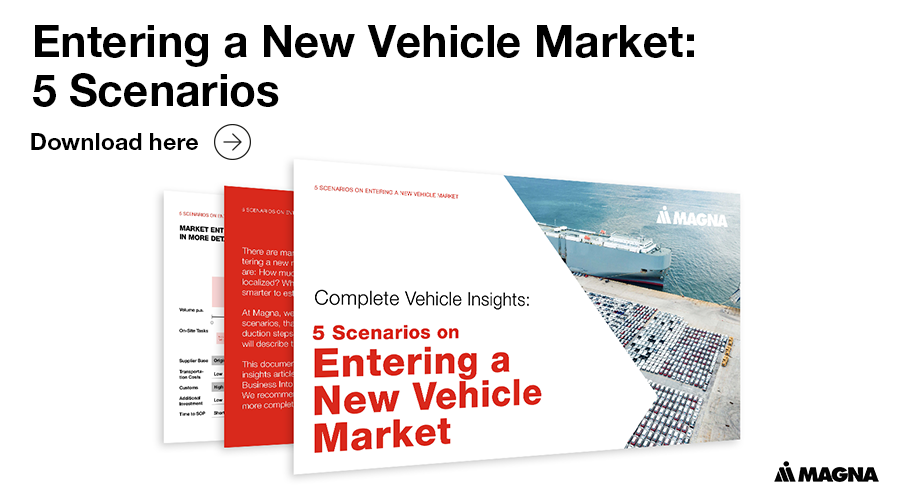
5 + 1 Reasons Why Automotive Startups Fail in the First Year
- Dietmar Kleindienst
- September 08, 2022
- 5-min read
The transition towards electric mobility has opened up the automotive industry for new and innovative startup ideas. Yet, not all new automotive players trying to enter the market are successful in doing so or can secure their market share in the long run.
This article will highlight the 5+1 most common reasons why some automotive startups have the potential to fail within their first year of business.
We will focus on areas that can be mitigated or even avoided if they are considered in time. Keep in mind, this article is a guide for the most common issues to look out for; it is not a complete “instruction manual” nor does it guarantee a successful market entry.
TABLE OF CONTENT
> Reason #1: A lacking understanding of their target market
> Reason #2: They are unable to find and keep investors
> Reason #3: They don't acquire suitable development & manufacturing partners
> Reason #4: Their business case is unrealistic
> Reason #5: They have underestimated EV vehicle development
> Reason #6: And sometimes, it's simply bad luck
> What's next?
REASON NR. 1: LACKING UNDERSTANDING OF THE TARGET MARKET
Both investors and development and manufacturing partners require a solid business case based on conclusive market research.
The EV market is thriving, but…
Although the EV market is full of opportunities for new manufacturers to enter, there are already many startups competing for a niche in the market. Thus, the window of opportunity for market entry will narrow. Furthermore, established OEMs are expanding their portfolios in the EV sector considerably. With decades of experience in the industry, established carmakers still have a head start over their startup counterparts.
For startups to succeed in the EV market, it may be more profitable to find a promising market niche than to compete with the large OEMs directly.
The key lies in conducting thorough market research
Regardless of the target market chosen, it is absolutely necessary to know the market inside out beforehand. This means that thorough market analysis should be at the very top of every startup’s to-do list and should be conducted as early as possible.
A market analysis should answer the following questions about the target market:
- How large is the market?
- What’s the expected market performance? How many vehicles can potentially be sold and in what timespan?
- What demographic/psychographic traits define the market?
- What prices will be accepted by the end customer?
- What does the target audience expect from their vehicle in terms of features and functions? Which features are most important to them?
- What regulations or legal requirements are relevant for the market?
- What trends and developments of the market should be considered?
- Which competitors are present on the market?
The market study is the document that sets the framework in which the future business will operate, which means it is necessary for creating a strong business case and subsequently get partners and investors on board. Even the most convincing idea will not get support if the expectations in terms of revenue, shares and profits are too far from reality.
REASON NR. 2: TROUBLES IN FINDING AND KEEPING INVESTORS
Financial demands for an automotive startup are enormous. Even under the most favorable conditions there is a huge amount of capital necessary before a concept can leave the drawing board. And while the initial steps of assessing the market and its competitors, validating the product vision, and first press releases can all be funded through methods like SPACs1, the project still has a long way to go before it will become profitable.
Startups and new entrants will therefore need to find suitable long-term investors before any actual automotive development can start2. But getting those investors on board and keeping them in the project often presents its own array of challenges.

Investors are cautious when it comes to vehicle startups
In general, new players in any market are a rather uncertain business endeavor for investors. They naturally do not yet have the long-standing presence of established competitors on the market.
This means that from the perspective of an investor, they may be supporting a business whose success in the long run is not yet secure. This can deter some investors – and may be a hurdle for new entrants to overcome.
Startups must convince investors throughout the project
Even with the investors on board, there is no guarantee for their continued support of the project. Whether unforeseen difficulties in development, a changing market situation, or investor-specific reasons, investors may lose faith or interest in the new entrant, their vision, and their ability to finalize the project and gain the expected profit margin.
Startups need to continuously prove their vision’s legitimacy, which can only succeed by showing steady progress according to plan and maintaining trust for the validity of the project and the capacities of its originator.
To this end, communication, timing and passion are vital. Schedules need to be conceived accurately beforehand and then followed through. Communication must be kept transparent, and meaningful updates on the project conveyed frequently. And finally, if a project can evoke emotional interest in an investor beyond profit margins, they will also be more likely to stick with the project in the long run.
REASON NR. 3: NOT ACQUIRING SUITABLE DEVELOPMENT AND MANUFACTURING PARTNERS
Just as investors provide the financial foundation for an EV project to get going, the technical requirements need an experienced development and manufacturing partner to be implemented properly. Without such support, it could be much harder to follow through with the project and to transfer the initial idea into more concrete concepts.
Development and manufacturing partners can support an automotive startup in several ways. They validate the initial product vision in an early phase well before development starts, and thus help the project to take off into the right direction. Consequently, it is easier to find the ideal target market and investors for the project. Competent partners can also handle the complete vehicle development process from the first conceptualization of the complete vehicle down to singular components. And they can provide up-and-running manufacturing sites, including the necessary processes and workforce to start production swiftly and easily.
In short, development and manufacturing partners are a new entrant’s best bet to successfully realize the project. Yet, there are several reasons why the two parties might not agree on a cooperation.
The development and manufacturing partner’s services don’t fit the startups needs
A startup can either cooperate with an established OEM or an independent partner. As the most common distinction, OEMs are selling their own branded vehicles, while brand-independent partners are not. Hence, their range of services as well as the attached preconditions differ substantially.
If you manage to find an established OEM that is willing to cooperate at all, the OEM might even offer access to their vendor and after-sales network, which can be seen as a big benefit. However, the cooperation may come with other limitations, such as using the OEM’s platform with limited adaptations or restrictions as to where and how the startup’s vehicle can be sold.
For brand-independent partners, such as Magna, cooperating with startups is a part of their daily business. They do not have a vendor and after-sales network – but, having no own vehicle portfolio, they are free to realize vehicle projects according to their customers’ individual wishes.
The business case does not convince the development and manufacturing partner
A development and manufacturing partner may also choose not to support a startup if the idea itself is not convincing. For example, some EV visions may seem feasible at first but prove to be impossible to realize when reviewed by technical experts.
On the other hand, technologically sound ideas can also fail to convince partners if the business case is not sound or based on unrealistic expectations. Building a lasting market position in the automotive industry takes a lot of time and effort, so it is important for startups to focus on manageable goals backed by solid market knowledge.
They are at full capacity
Sometimes, a development and manufacturing partner simply has no capacity to take on a new project. In that case, a startup really has limited options: look for a different partner, split up their production between different partners, or wait until capacities are available again.
REASON NR. 4: AN UNREALISTIC BUSINESS CASE
The business case is probably the most vital building-block of a startup’s portfolio. The business case is the comprehensive and detailed answer to one basic question: How does the project create value for a business partner? As such, it’s the most important document any potential partner will look at before deciding on cooperating.
However, being so critically important, a weak business case can be the cause of startup failure. Thus, well-researched information and sound knowledge of EV development are essential to avoid working with an unrealistic picture of the market.
Overestimating the potential revenue
Many startups start their journey highly optimistic – sometimes, too much, leading to an overestimation in the expected revenues. Potential mistakes are either setting the target audience too large, increasing the price range without adjusting the customer base accordingly, or only regarding the most optimistic scenarios. As a consequence, an EV project may sound more profitable than it actually is.
A lack of technological knowledge
Also on the technological side, startups can fall into several traps. The most common issues are misconceptions about the cost of certain technologies or wrong assumptions about which innovations are already suitable for series production.
REASON NR. 5: UNDERESTIMATING EV VEHICLE DEVELOPMENT AND MANUFACTURING
As we stated before – the EV market is full of opportunities, and the right time to enter it is right now. However, that does not mean that a successful market entry is a quick and easy endeavor. Firmly establishing a new business in the automotive industry is far more challenging and time-consuming.
Underestimating time requirements
Many automotive startups are under time pressure to get their production running, generate revenue, and enter a certain market niche before competitors do. However, it is still essential to focus not just on a timely SOP, but to calculate enough time for the entire process, thoroughly plan key milestones and consider essential prerequisites early enough. For example, validation and onboarding key suppliers are two aspects that tend to be underestimated by startups.
Underestimating the complexity of vehicle development and manufacturing process
As soon as the preparatory work is finished – validating the product vision, finding investors and partners, revealing the brand, etc. – the concept phase starts. During this phase, a lot of tasks suddenly appear all at once and for many new entrants, this is when the sheer size and depth of vehicle startups really starts to show.
First, the vehicle idea itself will now be compared to similar models. Vehicle targets will be specified, and the complete vehicle is broken down into thousands of objective and subjective measurements that it needs to reach. All of those need to be tested, validated, and consistently worked through until it is clear which components and systems are needed to get all of them into one complete vehicle.
Another task that often begins in parallel with the concept phase is the site selection process for the vehicle production. This requires a lot of planning and preparation, particularly if the factory needs to be set up from scratch. Permits need to be obtained before any work can occur. Its infrastructure, supply chain, and manufacturing processes need to be optimized, a workforce has to be recruited, trained and retained, and a suitable ecosystem of hundreds of suppliers must be established.
The biggest showstopper? Financial requirements can exceed the EV startup’s resources
Setting up and maintaining all these factors requires considerable financial means – often more than initially anticipated. The sudden increase in resources, time, manpower and energy can strain or even exceed the startup’s financial resources.
REASON NR. 6: AND SOMETIMES, IT'S SIMPLY BAD LUCK
Even with all detailed planning and taking all possible precautions, success is still not guaranteed – unfortunately. There are still many factors and developments that can negatively impact the project. Key employees may drop out due to personal reasons, market developments may suddenly increase prices for important raw material, and sometimes a global crisis affects the entire industry.
The potential reasons for failure are infinite, and it is impossible to anticipate all of them. What can startups do?
On the one hand, they need to recognize potential mistakes that can be fixed by research and preparation and act accordingly.
On the other hand, it is also essential to recognize the factors they are not responsible for.
The key to success in dealing with unforeseen events is to think and react quickly with an appropriate response, even if no plan or analysis has been prepared.

WHAT'S NEXT:
To summarize, there are five main reasons why EV startups can sometimes fail:
- They don’t perform a thorough market analysis
- They are unable to find and keep investors
- They don’t look for a suitable development and manufacturing partner
- They create an unrealistic business case
- They underestimate automotive development and manufacturing
Even if the market shows huge potential and even if public interest and demand are high – it is important to keep in mind that creating an EV requires thorough planning, adequate time and resources, the right partners, and the resilience and flexibility needed for such a task.
Stay connected with Inside Automotive!
You can keep updated with Magna's Inside Automotive through email alerts in real time. Subscribe now!

Dietmar Kleindienst
Dietmar Kleindienst is Director of Key Account & Business Development for North America Region and new entrants on a global base of Magna Steyr since 2021. He joined Magna in 1994, and before he joined the Sales & Marketing organization in 2018, Kleindienst held several operational and management positions in Supply Chain Management, Manufacturing Engineering and Program Management in Graz, Austria and within abroad assignments in North America. He holds a degree in Industrial Logistics.
We want to hear from you
Send us your questions, thoughts and inquiries or engage in the conversation on social media.
Related Stories

Market and Industry in Transition: How a Competent Partner Can Help Navigate Challenges in the Automotive Industry
Inside Automotive
.tmb-widescreen.webp?sfvrsn=8d57edff_1)
Successfully Starting Series Production: Start-up Management in the Automotive Industry
Inside Automotive

Strategy and Prototyping in UI/UX Development for Vehicle Control Concepts on Behalf of Customers
Inside Automotive

Professional Risk Management and Financing in Automotive Serial Production
Inside Automotive
Stay connected
You can stay connected with Magna News and Stories through email alerts sent to your inbox in real time.
